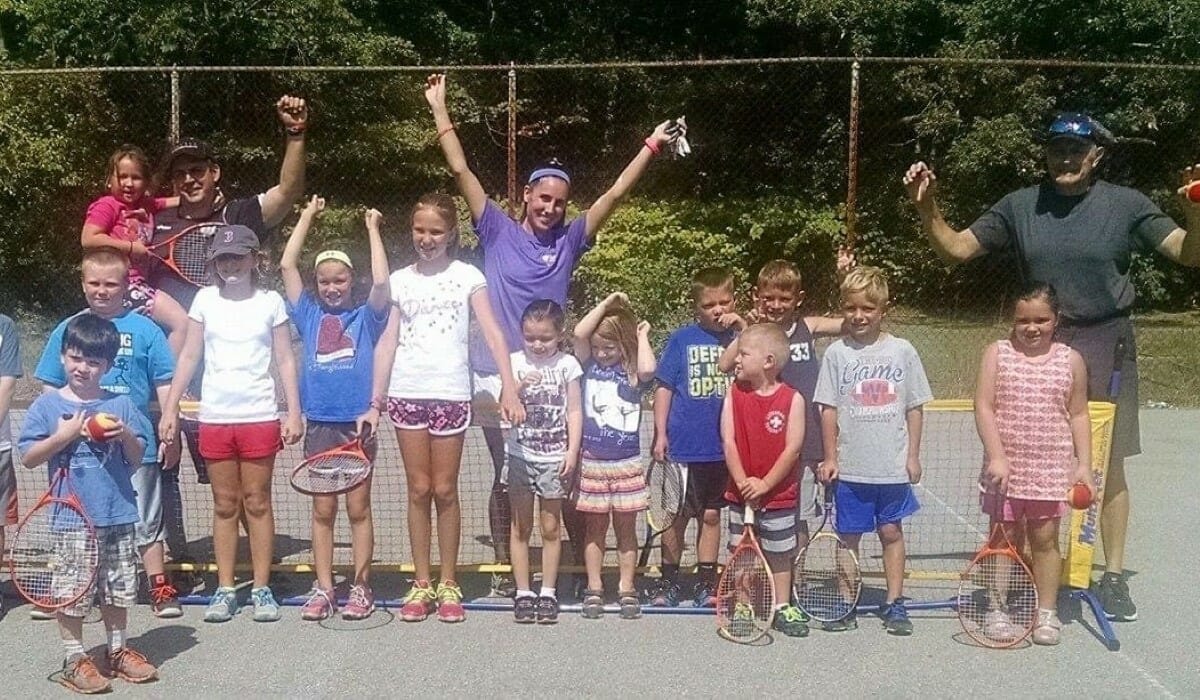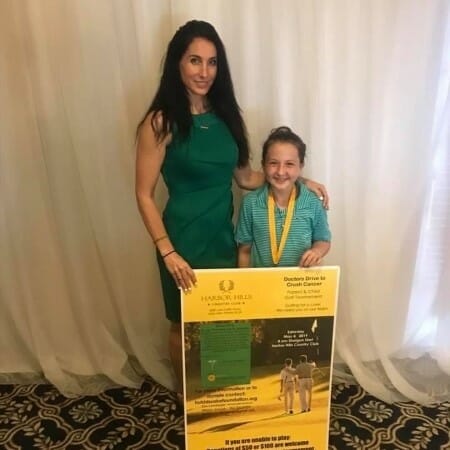Mom Raises Millions For Families Impacted By Pediatric Cancer

Meet Daily Point of Light Award honoree Megan Jusczyk. During the third annual Global Volunteer Month, we celebrate the power of people who tackle society’s greatest challenges, and build stronger, more vibrant communities through volunteerism and everyday actions, like Megan. Read her story and join the Global Volunteer Month celebration.
When Megan Jusczyk received the devastating news that her daughter Malia was diagnosed with stage four neuroblastoma cancer, it was compounded by also learning how little funding there was for pediatric cancer research. Despite being the number one disease killer for kids in the United States, the National Cancer Institute only allocates four percent of their budget to researching childhood cancer. Her desire to make a difference in the lives of other families affected by pediatric cancer led Megan and her husband to found For Kids’ Sake Foundation in 2011.
The nonprofit aims to raise both funding and awareness for neuroblastoma cancer through annual fundraising events. In the past 11 years, For Kids’ Sake Foundation has raised over 2.1 million dollars for pediatric cancer, with half of funds going to research and the other half being donated to help alleviate families’ expenses as they seek treatment for their child. While funds are primarily donated to families in Megan’s native Massachusetts as well as Florida, the nonprofit has helped families all across the country and internationally.
What inspired you to start For Kids’ Sake Foundation?
My daughter Malia was diagnosed on April 1, 2011 with stage four neuroblastoma cancer. I had never really heard it. Maybe I had seen a St. Jude’s commercial. In my mind, if kids got sick, it was very, very rare, and they all were cured, and St. Jude saved everybody. That was not the case. When Malia was diagnosed, it was a big wake up call for how devastating a diagnosis is. I didn’t know it was the number one disease killer of kids in the United States — that was shocking to me — and how little funding there was for research. In addition, we’ve met a lot of parents. They say over 50 percent of families end up going bankrupt from a pediatric cancer diagnosis, because typically one parent has to stop working and the other parent has to work less. I know Malia was a 14-month protocol, and a lot of times both of us had to be there. One of us had to be there all the time, so my husband stopped working completely. It was a very big wake up call when my daughter was diagnosed.

Where do you allocate the money you raise?
We fund research because only four percent of the National Cancer Institute’s budget goes to kids’ cancer, even though it’s the number-one disease killer. That’s [astounding] to me, and I truly believe will change, but that’s the way it is right now. Half of our money goes to research and half goes to families struggling to pay bills. Let’s say there’s a $10,000 deductible, and then there’s travel expanses. … Sometimes these families have to go out of state. All these expenses pile up and there’s not a ton of resources. Parking, for example, is $55 a day when you’re in New York City. Not everyone can even fathom doing that, so we try to help out so kids can get the treatment they need.
What drives you to put so much work into this organization despite all that you are going through while your daughter is in treatment?
I continued at the same level of passion through all those years because I would look at my daughter and I would see how she smiled through it all, everything we put her through, and she still loved us as parents. What a gift. Physically and emotionally, it feels like you’re torturing your child. The treatments are brutal. The fact that she could put a smile on her face, get up everyday, and work hard to become a great soccer player and softball player — the fact that she could get up and put that work in, how could I ever stop trying to help these families? It just wasn’t an option. These kids are giving their everything. Every single one of those kids are doing it. People are like, ‘Malia, she’s special and different,’ — of course she is, but every single one of those kids is fighting to live, and every single one of those families is giving everything that they can. If I’m in a position to help, how could I not?
What kind of feedback have you gotten from families you’ve been able to help?
It’s usually like, ‘thank you so much for allowing us to bridge that gap.’ It is about trying to help them through that financial toxicity piece that comes with a pediatric cancer diagnosis. It’s this little area that they need help. They just need help for this amount of time, and then hopefully they are in a place where their child is cancer free. Sometimes we pay mortgages for a month to give people that extra money to be able to spend on the nickel-and-diming little things. People are incredibly grateful. Speaking as somebody who has lived through it, I don’t want them to have to beg their friends for money or set up a fund where they have to beg their family for money. We try to help as much as we can as a medium-sized nonprofit, and I also try to let them know of other nonprofits where they can get help.
Do you have any future partnerships, programs, or events you want people to know about?
On June 26, we’re doing our 5K & 10K to Crush Cancer at the Plainville Park. It’s a great event to sponsor and participate in. It’s a great event to just go, even if you just want to cheer on the runners. We do a superhero theme if people want to dress up in superhero costumes. We encourage that because these kids are little superheroes, so it’s very appropriate to have a superhero theme.
Is there a specific fundraising event that is particularly memorable for you?
The 5K & 10K to Crush Cancer is an event we do in our hometown of Plainville, Massachusetts. We’re doing our 12th one this year. We started the event as soon as Malia was diagnosed, and we did it a few months later. Malia runs it. We’ve gotten to see her cross the finish line multiple years and run with her friends. That’s definitely the most exciting event, because she really gets to participate. She knows we enjoy it, but she doesn’t know how lucky we feel that we get to see her alive and thriving and running a 5K, and how much joy that brings us as parents because we know how lucky we are to have her.
What’s been the most rewarding part of your work?
To be in a position where you can help somebody when they need it most.
What do you want people to learn from your story?
To contact their legislators and tell them that four percent is unacceptable. Pediatric cancer is the number-one disease killer and we want change.
Do you want to make a difference in your community like Megan? Find local volunteer opportunities.